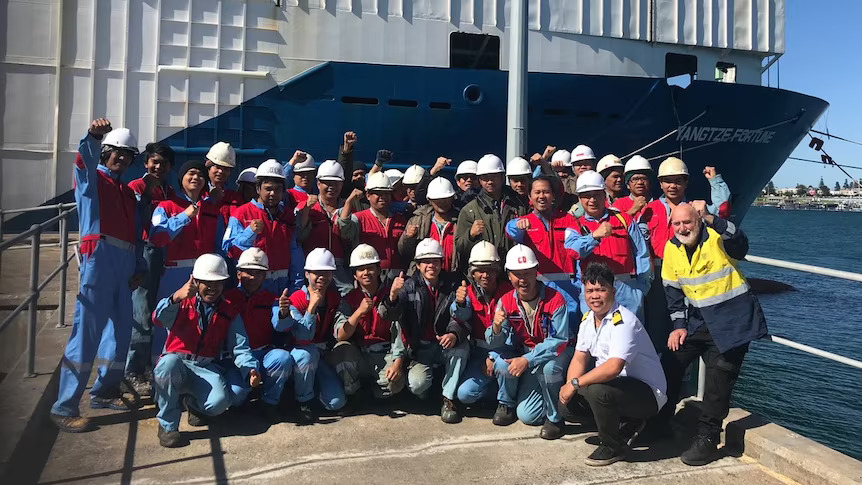The International Transport Workers Federation (ITF) has reported a concerning 11% increase in the number of abandoned vessels in 2023 compared to the previous year.
Seafarers are considered abandoned if their employer fails to pay for their return home, neglects their maintenance and support, or ends their employment unilaterally, including not paying their wages for at least two months.

The ITF documented 129 out of 132 abandonment cases in 2023, with unpaid wages exceeding $12.1 million. A total of 1,676 seafarers from abandoned ships reached out to the ITF, with over 400 of these cases involving Indian seafarers.
So far, the ITF has recovered over $10.9 million in owed wages from 60 of these vessels. The total amount recovered is expected to surpass $12.1 million as ongoing cases are resolved and more seafarers come forward.
The ITF criticized the rising trend of seafarer abandonment, describing it as a result of an industry that treats seafarers as disposable. The organisation highlighted the severe impact on seafarers and their families due to shipowners’ greed and non-compliance, which undermines their well-being, dignity, and basic human rights.
In late 2022, a joint working group from the International Labour Organization (ILO) and the International Maritime Organization (IMO) established guidelines to address seafarer abandonment. However, the 11% rise in cases the following year underscores the persistence of the issue.
These guidelines outline the procedures for states when a shipowner fails to meet their obligations for repatriating seafarers, paying outstanding wages, and providing essential needs like medical care. Seafarers in these situations are deemed abandoned. The procedures include creating national standard operating procedures (SOPs) in collaboration with seafarer and shipowner organizations to clearly define the responsibilities and roles of various national stakeholders, such as seafarers’ welfare boards, shipping agencies, and recruitment services.



Wonderful work! That is the kind of info that aare meant to be shared around the web.
Shame on the seek engines for no longer positioning this put up upper!
Come on over and consult with my web site . Thanks =) https://Evolution.org.ua/
I don’t think the title of your article matches the content lol. Just kidding, mainly because I had some doubts after reading the article.
Your article helped me a lot, is there any more related content? Thanks! https://accounts.binance.com/pl/register?ref=YY80CKRN
Nice blog right here! Additionally your web site so much up very fast! What host are you using? Can I get your associate link in your host? I wish my website loaded up as fast as yours lol
Can you be more specific about the content of your article? After reading it, I still have some doubts. Hope you can help me.
Thanks for sharing. I read many of your blog posts, cool, your blog is very good.
Can you be more specific about the content of your article? After reading it, I still have some doubts. Hope you can help me.
Your article helped me a lot, is there any more related content? Thanks!
Your article helped me a lot, is there any more related content? Thanks!
Can you be more specific about the content of your article? After reading it, I still have some doubts. Hope you can help me.
Your point of view caught my eye and was very interesting. Thanks. I have a question for you. https://www.binance.com/cs/join?ref=S5H7X3LP
Can you be more specific about the content of your article? After reading it, I still have some doubts. Hope you can help me. https://accounts.binance.com/register?ref=P9L9FQKY
Your point of view caught my eye and was very interesting. Thanks. I have a question for you.
Ahaa, its pleasant conversation concerning this paragraph at this place
aat this weblog, I have read all that, so at this tme me also commenting here. https://Menbehealth.Wordpress.com/
Your point of view caught my eye and was very interesting. Thanks. I have a question for you. https://accounts.binance.info/sl/register?ref=PORL8W0Z
You should take part in a contest for among the finest blogs on the web. I will recommend this website!
Heloo there! I simply want to offer you a big thumbs up for your great
information youu have got right ere on this
post. I will be returning to your website foor more soon. https://Jobmonsters.gr/employer/experienced-writer-for-research/
Thank you for your sharing. I am worried that I lack creative ideas. It is your article that makes me full of hope. Thank you. But, I have a question, can you help me?
34sv62
Your article helped me a lot, is there any more related content? Thanks!
Can you be more specific about the content of your article? After reading it, I still have some doubts. Hope you can help me.
Very good https://rb.gy/4gq2o4
Can you be more specific about the content of your article? After reading it, I still have some doubts. Hope you can help me.
Good https://is.gd/N1ikS2
Awesome https://is.gd/N1ikS2
Your writing is like a well-tuned instrument, each word and sentence perfectly balanced to create something beautiful.
Thanks for sharing. I read many of your blog posts, cool, your blog is very good.
amei este site. Para saber mais detalhes acesse nosso site e descubra mais. Todas as informações contidas são conteúdos relevantes e diferentes. Tudo que você precisa saber está está lá.
Thank you for your sharing. I am worried that I lack creative ideas. It is your article that makes me full of hope. Thank you. But, I have a question, can you help me?
Your point of view caught my eye and was very interesting. Thanks. I have a question for you.
https://shorturl.fm/a0B2m
https://shorturl.fm/5JO3e
https://shorturl.fm/bODKa
https://shorturl.fm/A5ni8
https://shorturl.fm/FIJkD
https://shorturl.fm/bODKa
https://shorturl.fm/A5ni8
Thank you for your sharing. I am worried that I lack creative ideas. It is your article that makes me full of hope. Thank you. But, I have a question, can you help me?
https://shorturl.fm/5JO3e
https://shorturl.fm/6539m
https://shorturl.fm/TbTre
https://shorturl.fm/9fnIC
https://shorturl.fm/bODKa
https://shorturl.fm/YvSxU
https://shorturl.fm/a0B2m
https://shorturl.fm/j3kEj
https://shorturl.fm/m8ueY
https://shorturl.fm/9fnIC
https://shorturl.fm/PFOiP
https://shorturl.fm/eAlmd
https://shorturl.fm/VeYJe
https://shorturl.fm/JtG9d
https://shorturl.fm/hevfE
https://shorturl.fm/Xect5
https://shorturl.fm/nqe5E
Thanks for sharing. I read many of your blog posts, cool, your blog is very good.
Thanks , I’ve just been searching for info about this subject for ages and yours is the best I’ve discovered so far. But, what about the conclusion? Are you sure about the source?
https://shorturl.fm/xlGWd
https://shorturl.fm/f4TEQ
https://shorturl.fm/fSv4z
https://shorturl.fm/47rLb
Your point of view caught my eye and was very interesting. Thanks. I have a question for you.
Your article helped me a lot, is there any more related content? Thanks!
Hey! I know this is somewhat off topic but I was wondering if you knew where I could get a captcha plugin for my comment form? I’m using the same blog platform as yours and I’m having problems finding one? Thanks a lot!
Good day! I just would like to give a huge thumbs up for the good information you’ve got right here on this post. I will likely be coming again to your blog for more soon.
Thank you for your sharing. I am worried that I lack creative ideas. It is your article that makes me full of hope. Thank you. But, I have a question, can you help me?
Thanks for sharing. I read many of your blog posts, cool, your blog is very good.
I don’t even know how I stopped up right here, however I thought this put up was good. I do not understand who you might be but certainly you’re going to a well-known blogger in case you are not already 😉 Cheers!
I don’t think the title of your article matches the content lol. Just kidding, mainly because I had some doubts after reading the article.
I’ve recently started a site, the info you provide on this web site has helped me tremendously. Thanks for all of your time & work.
I’ve been absent for some time, but now I remember why I used to love this web site. Thank you, I?¦ll try and check back more often. How frequently you update your web site?